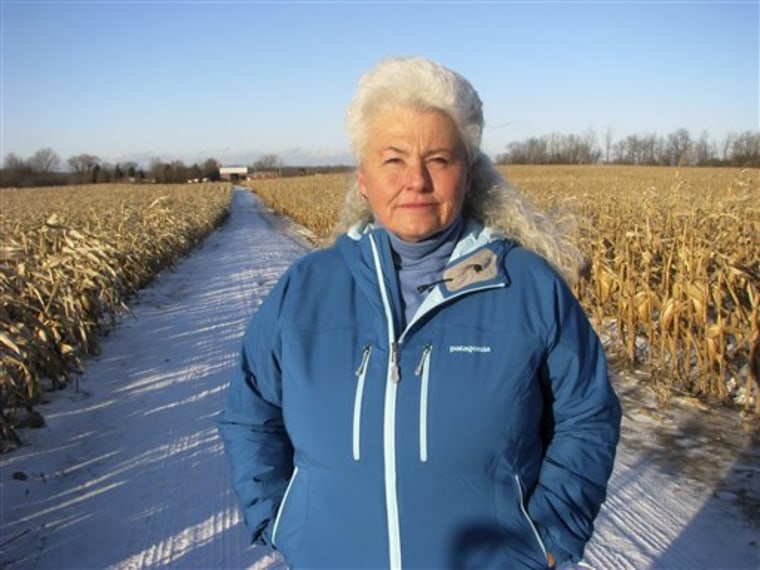Lynn Henning's southern Michigan farm is within 10 miles of a dozen large livestock farms, and for years she's gathered water samples and used aerial photography to help hold them accountable to environmental laws.
With the growth of factory farming over the past decade around the small, rural communities of Clayton and Hudson, Henning said government oversight has failed to keep pace. So in addition to being a full-time farmer, growing corn and soybeans with her husband, she's a full-time environmentalist.
"They don't have the funding or the staff to baby-sit these facilities and watch them around the clock," said Henning, 52, who has worked as a factory farm watchdog with the Sierra Club in Michigan since 2005.
On Monday, Henning will be honored in San Francisco with the Goldman Environmental Prize, an award for grass-roots activism that includes a $150,000 prize. The prize is among six given to environmentalists throughout the world.
The Goldman jury said Henning's work illustrates grass-roots efforts to police concentrated animal feeding operations, or CAFOs, which produce enormous amounts of manure and can threaten air and water quality.
The award comes at a time when environmentalists are trying to learn from each other. Their techniques include flyovers of North Carolina's Neuse River in search of pollution from big hog farms and a legal fight over a plan to open a massive dairy in Illinois near the Wisconsin state line that would start with 5,500 cows.
Some agricultural groups maintain that owners of most big livestock farms are mindful of environmental responsibilities and are careful dealing with waste. Manure is typically stored in tanks or huge lagoons before being spread on farm fields.
Shane Ellis, a livestock economist at Iowa State University, said many big farms have made drastic improvements in the how they manage waste and care for animals. He said the nation's food distribution system, made up of a small number of large, powerful buyers, creates tight margins and a need for big livestock operations.
Without them, he said, food prices would be higher.
"They are concerned about what they do," Ellis said. "They want to be good stewards of the livestock and the land around them. It's a change in how people are viewing ... those resources."
But some said not every operation holds itself to such a high standard.
"We still have all these cesspools out there," said Rick Dove, who from 1993 to 2000 watched over the Neuse River in a paid position with the Neuse Riverkeeper organization and has since volunteered with the group and others.
Environmentalists who fly over the river have been able to tell state water quality officials what hog farms were doing, said Dove, 70. States typically don't have the staff to keep such a close tab on large farms.
"They're still polluting the river like crazy, but at least we know how to go after them," Dove said.
In Illinois, opponents of a megafarm planned near Nora have been trying to block the dairy since it was proposed more than two years ago. A judge in December ruled to allow the project, but the case is on appeal and the group of smaller farmers and area residents who sued are trying to rally state support.
"The size is enormous," said Matthew Alschuler, who lives in Warren, about three miles from the dairy's site. "So many people moved here to get away from the city or have farmed for generations. ... All said, this is insane."
Henning said her focus on CAFOs began around 1999, when more began opening near her 300-acre farm in Hudson Township, about 70 miles southwest of Detroit. The farm has been in her husband's family for four generations.
Henning eventually became the CAFO Water Sentinel for the Michigan chapter of the Sierra Club.
Her work has been a factor in hundreds of environmental citations. It's also led to threats, she said, including dead animals being left on her home's porch or in her mailbox. The combine at her farm has been damaged, and she's been chased while trying to take water samples from public areas near big livestock farms.
Scott Miller, a district supervisor with the air quality division of the Michigan Department of Natural Resources and Environment, said Henning has been key in bringing pollution problems to the state's attention.
He described her as persistent, tenacious and passionate.
"She worked by herself for many years, basically observing waste handling practices at some of the larger animal farms and then monitoring the local streams," Miller said. After learning how to conduct water sampling, she taught others to do it.
Henning said she plans to donate much of her award money to environmental groups and to spend some on water monitoring kits.
"I hope it gives us the opportunity to educate," Henning said of the prize. "The agricultural practices and standards for CAFOs are not adequate."
